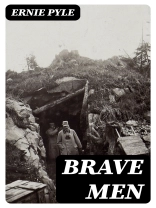In ‘Brave Men, ‘ Ernie Pyle crafts a poignant and unvarnished portrayal of American soldiers during World War II. Written in the first person, the narrative employs a blend of journalistic precision and lyrical prose, resonating with both emotional depth and stark realism. Pyle’s accounts from the front lines illuminate the experiences of ordinary men caught in extraordinary circumstances, revealing their vulnerabilities, camaraderie, and heroism amidst the chaos of war. Set against the backdrop of the tumultuous 1940s, the book serves as both a historical document and a deeply human exploration of courage, loss, and sacrifice. Ernie Pyle, a Pulitzer Prize-winning journalist, became renowned for his vivid reporting from the front during World War II. His deep empathy and commitment to showcasing the everyday lives of soldiers stemmed from his own experiences as a war correspondent. Having covered various theaters of war, Pyle’s encounters with these brave individuals inspired him to humanize the conflict, reflecting their struggles and triumphs in a manner that transcended mere battlefield accounts. ‘Brave Men’ is highly recommended for readers seeking an authentic and heartfelt perspective on the realities of war. Pyle’s ability to capture the essence of the human spirit in dire times resonates powerfully, making this work a vital resource for anyone interested in military history, journalism, or the profound complexities of human nature.
Про автора
Ernie Pyle (1900–1945) was an esteemed American journalist and war correspondent known for his impassioned accounts of World War II and the common soldiers on the front lines. Pyle grew up in Dana, Indiana, and attended Indiana University, though he left before obtaining his degree. He began his journalism career at a small-town newspaper and eventually became a columnist for the Scripps-Howard newspaper chain. Pyle’s work won him the Pulitzer Prize for Correspondence in 1944, reflecting his journalistic prowess and ability to portray the poignancy of war. His book ‘Brave Men’ (1944) is a collection of his syndicated newspaper columns, providing an intimate glimpse into the experiences of battlefield soldiers and their stories of bravery, camaraderie, and human resilience. Pyle’s poignant prose, characterized by its simplicity and clarity, endeared him to the American public, offering them a vicarious window into the lives of their loved ones serving overseas. Tragically, Pyle’s dedication to firsthand reporting led to his death during the Battle of Okinawa in 1945, but his legacy endures in the annals of American journalism and literary war chronicles. His contributions significantly influenced wartime reportage and literary style, making him an indispensable figure in the field of war correspondence and a voice for the voiceless soldiers.












